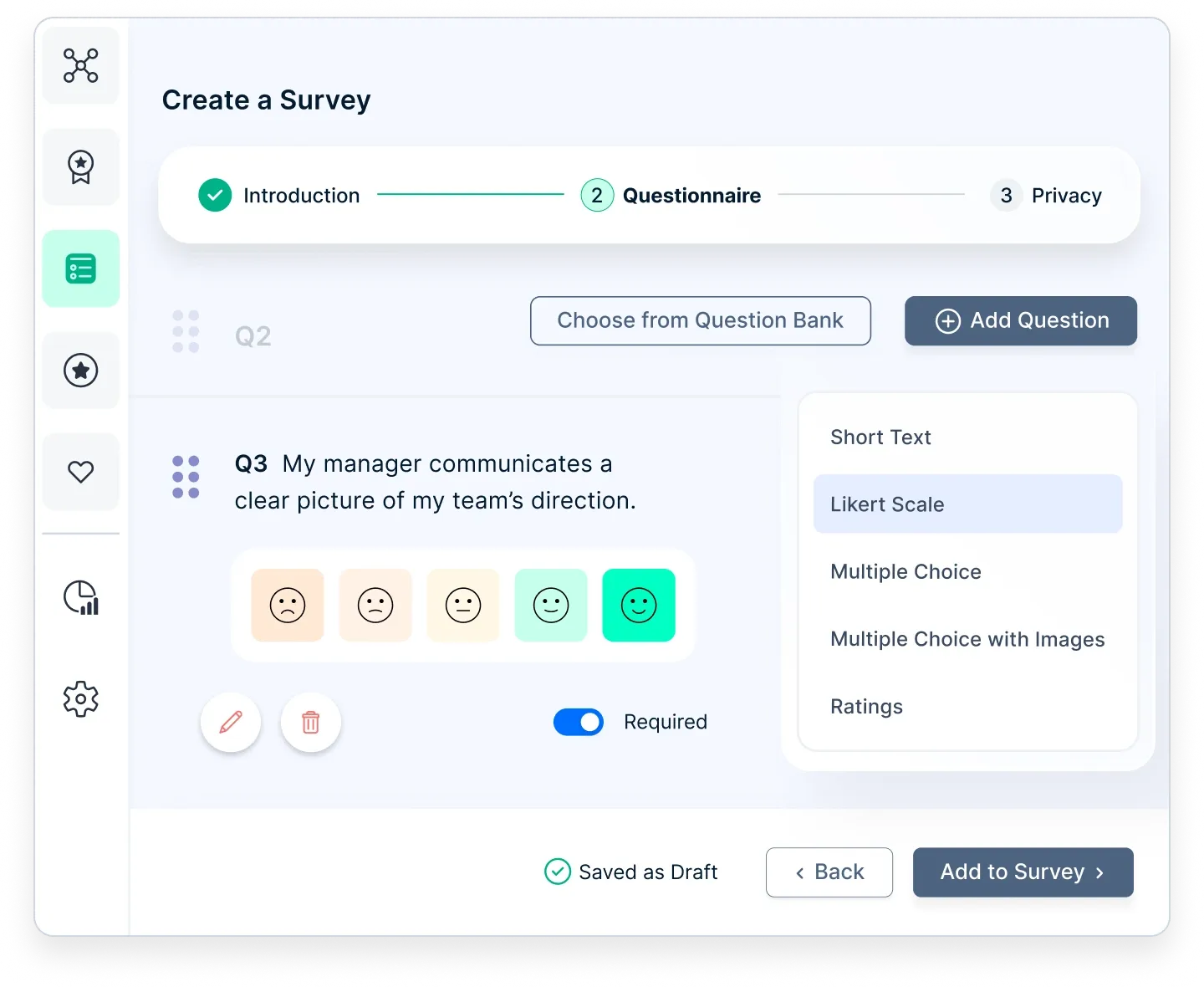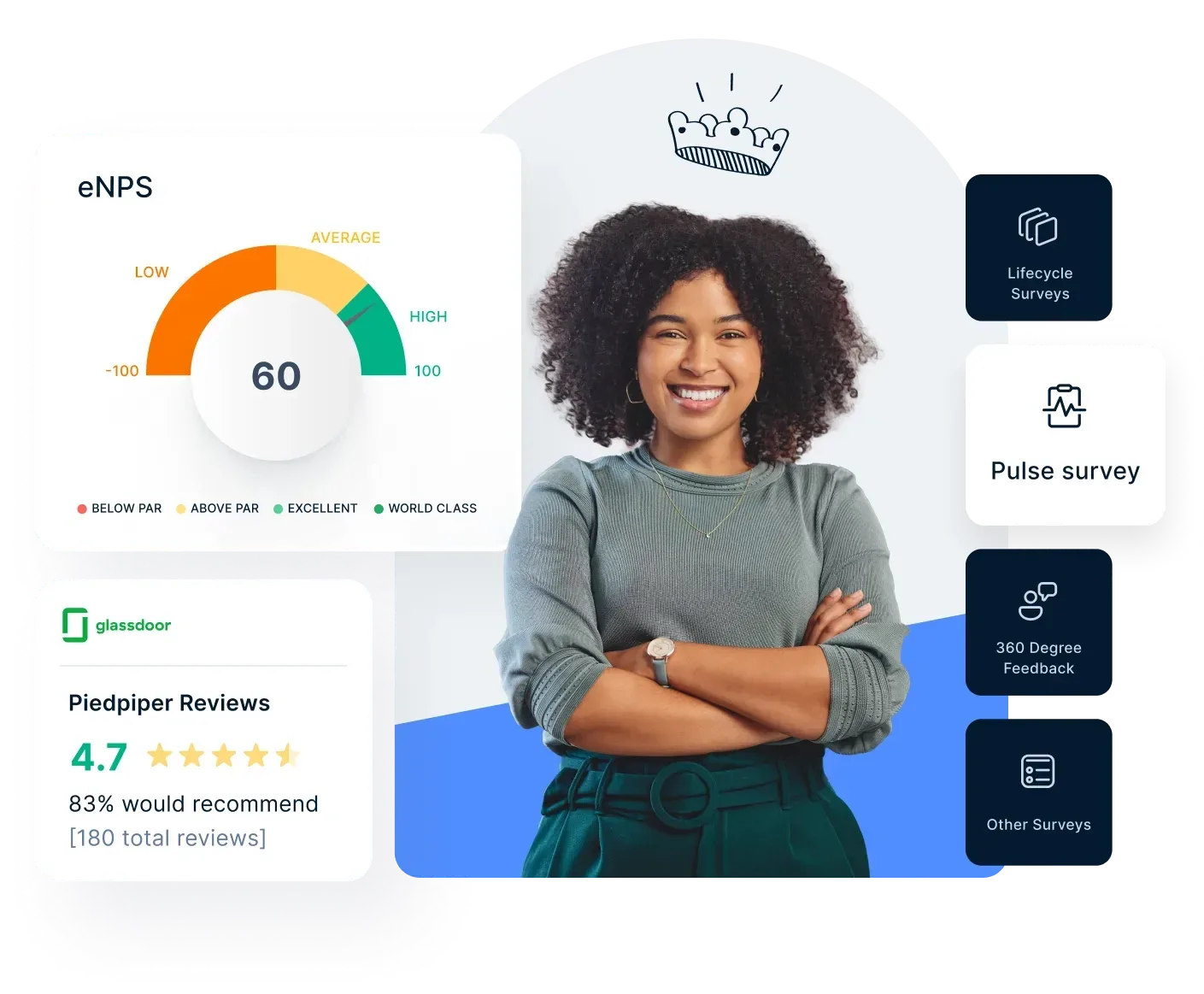120 Best One-on-One Meeting Questions for Employees to Ask in 2025
One-on-one meetings help employees discuss goals, challenges, and experiences. This guide offers 120 questions for 2025 to enhance communication, gain insights, and drive growth.
On this page
Gallup found that engaged employees are 17% more productive than their peers, with effective communication between employees and leadership playing a key role. Managers must understand their employees' work-life challenges to provide better support, and one-on-one meetings are an excellent way to achieve this. These meetings help clarify expected deliverables, goals, and well-being, fostering a stronger workplace connection.
Regular one-on-one meetings bring multiple benefits, including better communication, improved relationships, increased productivity, and stronger team spirit. However, employees often feel pressured, viewing these sessions as performance evaluations or extra workload discussions.
To make the most of these meetings, knowing the agenda and preparing the right questions can ease concerns and ensure productive discussions.
If you're unsure what questions to ask employees during one-on-one meetings, we’ve compiled a list of the best one-on-one meeting questions for employees to help guide these conversations effectively.
Importance of one-on-one meetings
A one-on-one meeting helps employees:
- To seek redressal for their problems and improve productivity.
- To build a healthy relationship with their employer.
- To ensure opinions and concerns are valued and considered.
- To be motivated and boost their morale.
Also, one-on-one meetings are crucial to the functioning of an organization as they fasten the redressal framework and smoothen the management process, among a variety of other things.
But you can maximize the impact of a one-on-one meeting once you are prepared. And that begins by choosing the right questions.
Top one on one meeting questions for employees to ask their employers
It is easy to presume that your management understands your daily struggles. However, managers must balance their workload, reports, inquiries, and crammed schedules. As a result, they require your insight into what is and is not working.
Employees should constantly inquire about anything that slows them down or prevents them from achieving their goals. Giving feedback and asking relevant questions can help you complete your tasks effectively and efficiently. Therefore, one-on-one meeting questions can help you gain more clarity about the discussion.
Consider the following list of the top one-on-one meeting questions employees should ask your employers:
One-on-one meeting questions employees should ask about career growth and development
1. How can I progress my career with the company?
2. Which skill can I improve between this meeting and the next?
3. Where do you see me in the next 6 months and 1 year?
4. What are the mentorship opportunities available for me?
5. What is the development and learning opportunities within and outside the company?
6. What should I consider adding to my growth plan?
7. What upcoming conferences or events should I attend?
8. What technical skills should I work on?
9. Are there any soft skills I should develop?
10. In your view, what are my strengths?
11. Who inspires you? Who are your mentors?
12. How can I help support and train others in the team and company?
13. Who in the company can help me learn the most?
14. What skills are our team lacking?
15. What skill gaps do you see on our team?
One-on-one meeting questions employees should ask about productivity, priorities, and strategy
16. What is your top priority presently? How can I help make your work easy?
17. What steps can I take to help improve the team’s performance?
18. How can I support my team better? Who on the team needs help?
19. As a team, how are we progressing toward our goals?
20. What job role are you considering hiring next for our team?
21. How can we improve how our team works together?
22. What do you want I took more ownership over?
23. If there were unlimited resources and budget, what would you change for our team?
24. What do you wish we did better as a team?
25. What do we do well as a team?
26. What are we doing to stand out from our competitors?
27. What’s worrying senior management right now?
28. What should I prioritize right now: quality or quantity?
29. Are there any tasks you want me to take on? It is what?
30. What are your team's long-term objectives?
31. Are you considering growing the team?
32. Do I need to do any tasks to prepare for our upcoming one-on-one?
One-on-one meeting questions employees should ask about teamwork and collaboration
33. With whom should I correspond or collaborate more frequently?
34. How can I get your best advice if I need it?
35. Which aspect of my work would you like to see more of?
36. What method of update delivery do you prefer?
37. What should I keep in mind when collaborating with different teams?
One-on-one meeting questions employees should ask about feedback and communication
38. Are there any adjustments I should make? Do you have any instances?
39. Has anyone offered any comments on my work? If yes, what are they?
40. How may I contribute better to our staff meetings?
41. What blind spots do I have?
42. Is my work quality below or above average?
43. How am I doing with [a specific thing about your job role]?
44. When’s the best time to get detailed feedback on my work?
45. What do you wish I did less of? Less of?
46. Do you feel I’m a team player?
47. How do you define a successful team and one-on-one meeting?
48. What’s a situation I’ve handled poorly internally, a situation I’ve handled well?
49. Where can my communication be improved?
50. Am I giving quality feedback to my peers?
51. What is everyone around me hesitant to share with me?
One-on-one meeting questions employees should ask for remote employees
52. Is my performance at par with the other in-office employees?
53. What do you expect me to accomplish as a remote employee?
54. What are the things I should do differently?
55. How can I communicate better with you?
56. What factors do you want me to work more on?
One-on-one meeting questions employees should ask about company culture and motivation
57. How can I get involved in workplace culture?
58. What qualities are important when hiring for our team?
59. Are there aspects of our culture you want to change?
60. What do you do to bypass burnout?
61. After a failure, how do you pick yourself up again?

Download Free Survey Templates to Improve Employee Experience
Get pre-built survey templates to measure engagement, gather insights, and enhance workplace culture. Find the right template in just a few clicks.
One-on-one meeting questions employees should ask around supporting your manager
62. What’s worrying you most?
63. How can I better support you?
64. What are your toughest challenges leading the team?
65. What are you excited about the most in your daily operations?
66. What’s the most challenging task of a people leader?
67. Is there anything I can do more or less to help you?
Apart from these detailed questions, you can also ask your managers about different bonus questions to break the ice and know more about their personality traits.
Icebreakers and “getting to know you” one-on-one meeting questions employees can ask
68. How are you?
69. How was your weekend?
70. What’s something you’re jazzed about outside of work?
71. What’s something that you’re looking forward to this week?
72. What is your favorite cuisine you could never live without?
73. What is your favorite restaurant in our city?
74. What is the most random job you’ve ever had?
75. If you woke up as a wild animal, which animal would you want to be and why?
76. What’s your dream vacation and why?
77. What is the best compliment someone gave you in the office?
78. What’s the funniest thing that’s happened to you while working from home?
79. What outdoor activities do you do, and how often do you get to do them?
80. What is your favorite color, and why is it your favorite?
81. What three things about you that no one here knows?
82. What was your least favorite college class, and why?
83. What was your favorite college class, and why?
84. What’s the best life advice you’ve ever received?
85. What’s the title of your autobiography if you wrote one?
86. What’s the kindest thing someone has done for you?
87. Who is the most inspirational personality you’ve ever met, and why?
88. What’s the worst job you’ve ever had?
89. What was your dream job growing up?
90. If you weren’t doing this job, what other career could you pursue?
91. How many siblings do you have, and what’s your number in the birth order?
92. If you could live anywhere worldwide, where would it be and why?
93. If you could have dinner with a public figure from history, who would you choose and why?
94. If money weren’t a consideration, how would you spend your life, and what would you do with your days?
95. What’s the craziest fashion trend you followed and looked back on with amusement?
96. Who was your best boss, and what characteristics made them great?
97. What’s your favorite activity you do at work, and why is it your favorite?
98. What movie, book, or song can you not stand, and why?
99. What kind of pet would you have if you could have any you wanted?
100. What’s your favorite song that gets you pumped up for the day?
You can use these questions to prepare yourself before any one-on-one meeting, which can help you achieve more clarity and ensure no miscommunication. However, you must remember a few things before having a one-on-one meeting.

Turn One-on-One Meetings into Actionable Conversations
One-on-one meetings should be more than just a check-in. With one-on-one surveys, managers can gather real insights, track employee concerns, and take meaningful action to improve engagement.
20 Questions for one-on-one meetings with employees
One-on-one meetings are a great opportunity for employees to discuss challenges, share feedback, and align with their managers on goals and expectations. Asking the right questions ensures these conversations are meaningful and productive.
Here are 20 essential questions to ask employees during one-on-one meetings to foster open communication and engagement.
- What aspects of your role do you enjoy the most?
- Are there any challenges preventing you from doing your best work?
- Do you feel you have the necessary tools and support to succeed?
- What recent accomplishment are you most proud of?
- Is there anything you would like to improve in your current workflow?
- What skills would you like to develop further?
- Do you feel you have enough opportunities for career growth?
- What long-term career goals are you working toward?
- How can I support you in achieving your professional development goals?
- Do you need any additional training or resources to grow in your role?
- How do you feel about the team culture and dynamics?
- Do you feel recognized and valued for your contributions?
- What motivates you to do your best work every day?
- Are there any aspects of your job that you find frustrating?
- What changes would make your work environment more engaging?
- Do you feel comfortable sharing feedback with me and the team?
- How can I improve the way I support or communicate with you?
- Is there anything you would like more clarity on regarding your role?
- How can we improve our one-on-one meetings to make them more effective?
- Do you have any suggestions for improving team collaboration?
These one-on-one meeting questions for employees help managers build trust, encourage open conversations, and create a workplace where employees feel valued, supported, and motivated.
Things to remember before going into a one-on-one meeting
Here are a few important tips to prepare yourself for a one-on-one meeting:
1. Schedule your meetings
You must decide the schedule of your meeting with your managers to avoid confusion and streamline your work simultaneously.
You can answer a few questions together:
- How long? 1 hour
- How often? Bi-weekly
- What day and time? Tuesdays at 2 pm
- Where? A virtual call or physical meeting
You can also create a recurring calendar event to ask questions and share feedback on different work aspects. Regular meetings can make you feel valued in your workspace.
2. Set meeting expectations and goals
Clarifying what you want to achieve from this meeting can streamline the flow and remove the tension beforehand.
A few examples of one-on-one meeting goals are:
- Discuss how you’re feeling and what changes you want to be made
- Talk about personal development and career growth
- To discuss roadblocks, challenges, and potential solutions
Also, it’s highly important to set expectations before your meeting. You can also ask your manager to contribute to the agenda of the meeting, which can help you prepare better.
A few examples of one-on-one meeting expectations are:
- You can both prepare for the meeting to discuss the agenda for better utilization of the time and to achieve better productivity
- Both of you will never cancel the meeting and will do everything to avoid rescheduling
- You will drive the conversation and ensure you share your questions without hesitation
To substantially improve collaboration and efficiency in one-on-one meetings, suggest to your employees using voice recorders or screen recorders. Screen recording makes it possible for participants to review important points and serves as a great resource for follow-up actions, increasing the effect of the meeting.
As opposed to taking copious notes, voice recording enables participants to concentrate more on the topic because they can listen to the tape later. As a result, the meeting will be more engaging and promote open dialogue.
3. Keep it professional and polite
Ensure you maintain a polite and professional tone for your questions. Don’t talk negatively about your team or use a high pitch with your manager.
Also, while asking icebreaker questions, keep your questions broad enough that your manager isn’t pressured into sharing very personal stories if they don’t want to do so.
Different individuals have different comfort levels while sharing personal details in the workplace. And to keep the listener comfortable, those differences must be respected during a one-on-one meeting.
One-on-one meetings create an open dialogue between employees and managers. The questions and best practices shared above can help you improve the results of your next one-on-one meeting and boost employee engagement within the organization.
Make one-on-one meetings more meaningful with Empuls

One-on-one meetings are an opportunity to build trust, improve communication, and align employee goals with organizational success.
With Empuls, managers can go beyond conversations by gathering structured feedback, tracking engagement trends, and fostering a workplace where employees feel valued.
How Empuls enhances one-on-one meetings:
- Use pulse surveys to collect real-time employee insights before and after meetings.
- Recognize and reward employees for their contributions to keep them motivated.
- Strengthen team culture with ongoing engagement and feedback initiatives.
- Enable managers to act on feedback with AI-powered analytics and insights.
Start using Empuls today to make one-on-one meetings more impactful and improve employee engagement.
Final words
Conducting regular one-on-one meetings can strengthen manager-employee relations and improve employee engagement.
However, to maximize the effectiveness of successful one-on-one meetings, build a strong company culture, and engage your employees actively, you require an advanced employee engagement platform like Empuls.
Empuls help build a connection between the employer and the employee, gauge employee engagement, recognize the employees’ efforts, and more.
An organization can also get continuous feedback from employees and managers regarding one-on-one meetings using employee engagement surveys. Empuls can provide real-time actionable insights from these surveys, which can help you listen and act accordingly.
Try the free demo version of the all-in-one employee engagement platform and strengthen your work ecosystem.


















